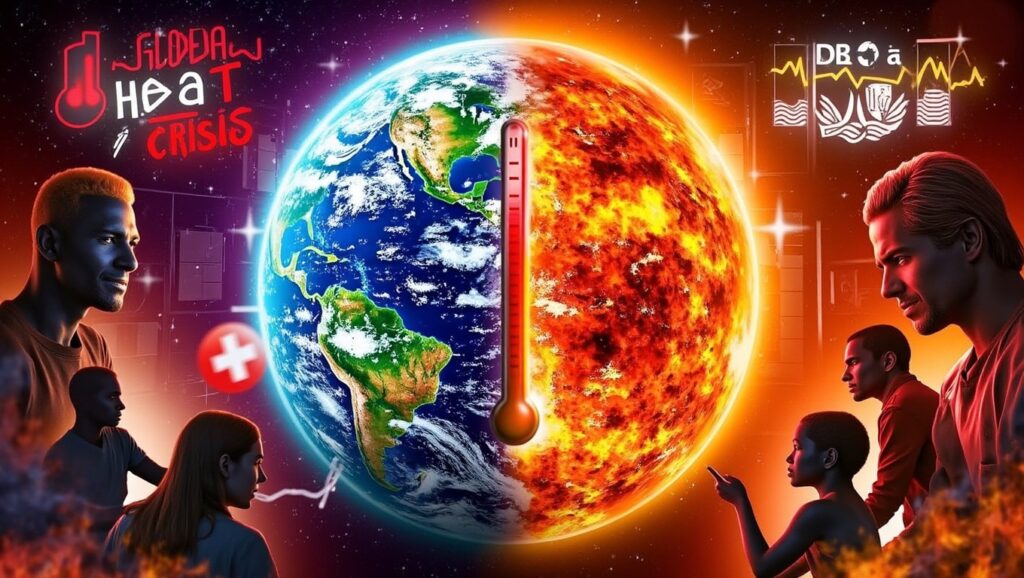Learn how extreme heat impacts health and discover strategies to stay safe. Heat and health are closely linked—protect yourself effectively.
The Global Impact of Heat and Health
As the world faces rising temperatures, the relationship between heat and health has become a growing concern. According to the World Meteorological Organization, 2023 has seen record-breaking heatwaves across the globe, with devastating impacts on public health. Extreme heat doesn’t just cause discomfort—it poses severe health risks, including heat-related illnesses and worsening pre-existing medical conditions.
On December 26, 2024, global attention shifts toward recognizing how rising temperatures affect human health and exploring ways to mitigate these challenges. Understanding this issue is crucial as climate change accelerates the frequency and intensity of extreme heat events worldwide.

How Heat Affects the Body
Prolonged exposure to high temperatures can overwhelm the body’s ability to regulate its internal temperature, leading to heat-related illnesses. The primary conditions include:
- Heat Exhaustion: Symptoms include heavy sweating, dizziness, weakness, and nausea.
- Heat Stroke: A life-threatening condition where the body’s temperature rises above 104°F, potentially causing confusion, seizures, or even death.
- Dehydration: High temperatures increase fluid loss through sweating, which, if not replenished, can lead to dehydration.
- Worsening Chronic Conditions: Heart disease, asthma, and diabetes are more challenging to manage during extreme heat due to additional stress on the body.
Vulnerable Populations
The health impacts of heat are not evenly distributed. Certain groups are more vulnerable, including:
- The elderly: Age-related changes reduce the body’s ability to regulate temperature.
- Children: Young bodies are less efficient at adjusting to extreme heat.
- Outdoor workers: Those who work in construction, agriculture, or other outdoor industries face prolonged exposure.
- Low-income communities: Limited access to air conditioning and healthcare amplifies heat risks.
Recognizing these vulnerabilities is essential to develop targeted strategies to protect at-risk populations.
Heat and Health: Scientific Insights
Numerous studies confirm the profound connection between rising temperatures and public health. The Lancet Countdown Report highlights that heatwaves cause tens of thousands of deaths globally each year. Moreover, heat-related illnesses strain healthcare systems, especially in regions unprepared to handle extreme weather events.
Experts from the Centers for Disease Control and Prevention (CDC) stress the importance of heat preparedness. Simple measures, such as staying hydrated, avoiding outdoor activities during peak heat, and using cooling systems, can significantly reduce heat-related risks.
Additionally, urban heat islands—where cities experience higher temperatures than surrounding rural areas due to concrete and asphalt—exacerbate health impacts in densely populated areas. This underscores the importance of urban planning to include more green spaces and reflective building materials.
Tips to Stay Safe During Extreme Heat
Protecting yourself and others during extreme heat is vital. Here are some practical tips:
- Stay Hydrated: Drink plenty of water throughout the day, even if you’re not thirsty.
- Dress Appropriately: Wear lightweight, loose-fitting clothing to stay cool.
- Plan Activities Wisely: Avoid strenuous activities during the hottest parts of the day.
- Create a Cool Environment: Use fans, air conditioning, or visit public cooling centers if necessary.
- Check on Vulnerable Individuals: Ensure that elderly neighbors or those with medical conditions are safe and hydrated.
By incorporating these practices, you can reduce your risk of heat-related illnesses and stay healthy during extreme temperatures.
The Importance of Awareness
Rising temperatures demand increased awareness and action. Governments, healthcare organizations, and communities must collaborate to improve heat resilience through public education, accessible cooling options, and urban planning initiatives. Simple measures, such as planting trees or designing cooler buildings, can make a big difference.

Conclusion: Staying Informed for a Healthier Future
Understanding the link between heat and health is crucial as climate change continues to reshape our environment. By staying informed, adopting preventive strategies, and making health-conscious choices, we can mitigate the risks posed by extreme heat. Let’s take proactive steps to protect ourselves, support our communities, and adapt to the challenges of a warming world.
Dengue and Severe Dengue: A Global Health Challenge


Pingback: Mpox: Understanding the Disease, Risks, and Protection - stay healthy today
Pingback: Cholera Crisis: Rising Cases Amid Climate and Conflict Challenges - stay healthy today